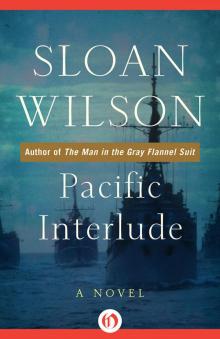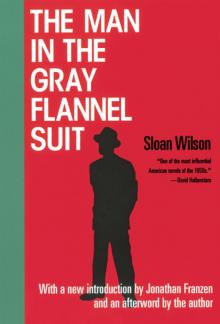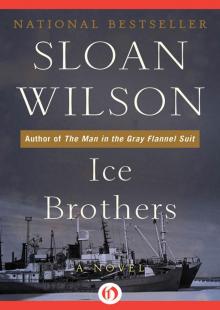- Home
- Sloan Wilson
A Summer Place Page 22
A Summer Place Read online
Page 22
They all loved the car, and decided that as soon as Molly’s summer vacation began, they would take a trip across the country to see the Grand Canyon and to visit several distant relatives in Wisconsin who might be expected to be properly flabbergasted by their mode of travel. In June they drove to Briarwood to pick up Molly at her school, and immediately set off for the West. Molly spent most of the summer sitting beside her grandfather in the front seat, or standing with dutiful awe before national monuments. Sometimes they covered as much as six hundred miles a day, and as old Bruce often said, it would have been a terrible trip in any car but a Cadillac.
John started that summer as an unpaid counselor at Camp Mantawana in Maine. Bart’s drinking habits had not improved, and his conscience bothered him less when his son was not around. Camp Mantawana was run by Mr. Newfield, the teacher at Colchester Academy who had befriended Bill Norris. Some of the boys at the camp were the sons of parents in large cities who worked hard to help their children to escape the heat, but others had, in effect, no parents. Almost a third of the youngsters at Mantawana simply shuttled from summer camp to boarding school and back again, seeing one divorced parent or another only for an occasional weekend, or for Christmas. Through long experience, Mr. Newfield and Dora, his sweet-faced wife, recognized these lonely youngsters at a glance, and treated them with special kindness. When a boy was discovered crying at night, Mr. Newfield often took him into his own cottage, and Dora would quickly slip on her bathrobe to prepare hot chocolate. It was surprising what Dora could do with a cup of hot chocolate and her soft, understanding eyes.
In search of the rare talents he needed, Mr. Newfield picked his counselors carefully, and kept a sharp eye on them. Before the end of July he promoted John to Senior Counselor, with a small salary, and asked him to help with some of the more difficult cases. There was, for instance, the son of a famous actress, a boy named Teddy, who at ten was painfully fat, and who wet his bed so consistently that he had to have rubber sheets. If the others had found out about the rubber sheets, Teddy would have been unmercifully ridiculed, so it fell to John to change the sheets secretly, slipping them quickly into a canvas bag. To facilitate this operation, John moved Teddy’s cot into a corner suitably screened from the others by a large chest of drawers.
One of Teddy’s difficulties was that no one wanted him for a partner when the boys were divided into mutually protective pairs for swimming. Feeling hurt, Teddy refused to swim at all, and on even the hottest days, remained sweating on the shore. It was John’s job to try to sound convincing when he invited Teddy to go swimming with him on the pretext that he himself didn’t want to go swimming alone.
John was so successful with Teddy that, before long, the boy was following him around like a large, mournful puppy. Mr. Newfield congratulated John and put him unofficially in charge of a whole group of misfits, including a boy who was prematurely tall and bent at the age of fourteen, a frantic little bully who got into fights almost every day, a stutterer, and a child suffering from a mild form of kleptomania. Finding that exhaustion appeared to be at least a temporary help to everyone’s problems, John often took his charges on long hikes over mountain trails and country roads. They made up an oddly bedraggled little army as they trudged along in their green uniforms, with their canteens wagging at their belts and their knapsacks bobbing on their backs. They liked to sing, John found, and there was curious pathos in their cracking voices as they piped, “Over hill, over dale, we will hit the dusty trail…”
Late in August Teddy’s mother arrived in a red sports car to visit her son and to introduce a new father, his third. A striking blonde who looked almost as good as her photographs, she seemed markedly ill at ease as she strolled with Teddy under the tall pine trees which ringed the camp. Apparently Teddy told her about John, for before she left, her husband, a small man who was beginning to get bald, took John aside. “We’re very grateful for what you’ve done for the boy,” he said nervously, and slipped a hundred-dollar bill into John’s hand. Then he got in his sports car with his wife, adjusted a plaid cap on his bald spot, and they drove off with the engine roaring. That night it was necessary to give Teddy several cups of hot chocolate.
“You show unusual sensitivity in dealing with troubled children,” Mr. Newfield said to John gravely a week later. “Have you ever thought of going into teaching?”
“I haven’t really made up my mind what I want to do,” John replied to avoid hurting Mr. Newfield’s feelings, but he knew he didn’t want to be a teacher. The loneliness of his charges increased his own until sometimes he grew so restless that he couldn’t stand still. The desire to escape the oppressive atmosphere of the camp got so bad one night that John bolted from his cot to take a stroll in the woods. His walk soon turned into a run, until he was zigzagging through the trees like a wild thing in full flight, with the branches whipping his face, and his breath coming hot. Finally he tired himself out and walked back in the moonlight to take a shower and try to sleep.
John couldn’t write Molly often that summer because her address was constantly changing. The communications he received from her were briefer than usual, because Molly had to share motel rooms with her mother, and had scant privacy in which to write. Often she sent postcards which she had hastily scrawled in lavatories. Wherever her family stayed more than a night, Molly insisted upon being allowed to take a walk alone, and sitting in some secluded spot with a pad, she wrote John descriptions of the sights she had seen. One long letter was devoted almost entirely to Bruce’s switch on the telephone, which Molly had observed without betraying the secret. She wrote a long rollicking account of her attempts to keep a straight face while Margaret droned criticisms of Bruce’s driving into the mouthpiece, and the old man sat at the wheel with a happy smile. From time to time he reached up and turned the speaker on for a few moments just to have the pleasure of flicking it off. Other than this, the tone of Molly’s letters was somber. “I try to think about the old settlers who crossed this country in oxcarts, and how brave they were,” she wrote once. “I wish I could be like them.”
On the first of September Helen returned with her family to Buffalo, and John was able to resume his half of the correspondence. His first missive was as close to a love letter as he had ever come. “Dear Molly,” he wrote, “I can’t stand this business of not seeing you much longer. I’ll be through here at camp next Monday, and Dad would never know the difference if I took a few days off before going back to the island and to school. Couldn’t I come up to Buffalo to see you? I have a little money now and would like to make the trip. If we had to, we could meet some place away from your home. I hope more than anything that we can arrange something like that. It’s been more than a year now! Please try to think of some place we can meet, and I’ll be there any time you say.”
He signed it, “Sincerely, John,” and addressed it “General Delivery, Buffalo, N.Y.,” as she had asked him to do.
When Molly read this letter she was not surprised. In spite of her fears, she had been hoping that he would ask to see her again, and on the long drive across the continent, she had enjoyed thinking about what she would do if he did. Locking herself in her room, she took out her paper and without hesitation wrote, “Dear Johnny, I certainly would like to see you, if you really don’t mind making such a long trip.” She paused and tried to think of a good place to meet. Delaware Park would be nice, but what would happen if it rained? She had a vision of standing there in a pouring rain waiting for him, and that wouldn’t be good at all. A movie house? It would be awkward to wait in the lobby with people walking by, any one of whom she might know. Suddenly she had an idea. Outside a small Catholic church which she had often passed on her way to the post office was a sign giving the schedule of Sunday services with the notice, “Always open to the public for meditation and for prayer.” Molly, who had been told by her mother and grandparents that Catholicism was wrong, had once been driven by curiosity to go there. Surprised to find that the interior
did not look entirely unlike that of the Methodist church her mother attended, she had sat there for a half hour in the dim light, enjoying the unaccustomed fragrance of incense lingering in the air, and the flicker of candles. Now the idea occurred to her that this church would be a good place to meet John. It appealed to her esthetically, and had the further advantage, she thought wryly, of being the least likely place to run into any of her mother’s friends.
“St. Mark’s Church on Cottonwood Avenue is open all the time,” she wrote John. “I’ll meet you in the right-hand pew nearest the door as soon as you arrive. Just let me know the day and time.”
By return mail John replied that he could get there by the following Tuesday, and that his train reached Buffalo early in the morning. “I’ll have breakfast at the station,” he said, “and if it’s all right, I’ll meet you at the church at nine o’clock.”
Molly told Helen and Margaret that the Halseys, whose daughter, Susan, also went to Briarwood Manor, had asked her to join them for a day’s drive to Canada. The Halseys had a huge old mansion on Delaware Avenue, and Margaret had been hoping that Molly would get an invitation from them. “That’s the advantage of a place like Briarwood,” Margaret told Helen. “By going there, she’ll meet the best people here.” Neither Margaret nor Helen made any objection when Molly said the Halseys were sending a taxi for her at a quarter of nine in the morning. The hour and the use of a taxi seemed a little peculiar, but who were they to question what people like the Halseys did?
Molly awoke at seven that Tuesday and was glad she had chosen the church as a meeting place, for although it was not yet raining, it was cold and gray. She put on a blue dress which she had chosen carefully the night before, and sat brushing her hair for a half hour. She wasn’t at all hungry, but she forced herself to drink a glass of milk. Twenty minutes before the taxi which she had called arrived, she was waiting at the window with her raincoat on her lap. When Helen and Margaret came downstairs with Bruce for breakfast, they noticed that Molly looked a little nervous, but who wouldn’t be, with the prospect of a day with the Halseys ahead? “You look very nice, dear,” Helen said. “You never will have to worry about your appearance in any company.”
“Thank you, Mother,” Molly replied.
When the taxi finally drew up in front of the house, Molly threw on her coat and dashed to it, only to find before getting in that she had forgotten her handbag. After returning for that, she entered the cab and sat back with relief. There was no fear that her mother would check with the Halseys, because Helen didn’t know them, and would be too ill at ease to call them in any but the most dire emergency. Molly sighed, and took from her handbag a lipstick. Staring into a small mirror, she applied it with the utmost concentration.
It was only ten minutes to nine when she got to the church, and she was dismayed to find that a funeral was in progress. A hearse was drawn up nearby, and a knot of men in formal clothes stood near the door. Molly paid the taxi-driver, turned and hesitated. Then she saw a young man dressed in a tan trench coat without a hat come across the sidewalk toward her, and recognized him as John—the angular features, the way he walked, yes, it was John, who looked frighteningly sophisticated to her now, and older. He hurried up and stood two feet away from her with his arms held tensely at his sides, and all he said was, “Molly.”
“Hello,” she replied.
A tired-appearing man in a swallow-tailed coat and striped trousers came toward them with a grave look and said, “Are you members of the family?”
“No,” John said. “I’m sorry.” He touched Molly’s arm, and they started walking down the street together. “I didn’t know there would be a funeral there,” Molly said to him, her own voice sounding unaccountably strange to her.
“I don’t mind funerals,” he replied. That sounded peculiar, and he added, “I mean when they’re somebody else’s.” That sounded worse. “I mean they don’t upset me when somebody I don’t know is being buried,” he concluded lamely.
“I feel that way too,” she replied.
They walked for another minute before they realized they had not the slightest idea where they were going. It was too cold for the park, and at that hour in the morning, it would be hard to find a movie open. “Would you like a Coke?” he asked suddenly.
“Sure,” she said. “There’s a drugstore just down the block.”
They sat across the table from each other in a booth and she took off her coat. He did not say he thought she was beautiful, and his eyes seemed to avoid her. They sipped Coca Cola from large glasses, and suddenly she heard herself chattering about the Grand Canyon, and Old Faithful, and the bears which came right up to the car and ate sandwiches out of her hand.
After an hour and two Coca Colas they felt self-conscious about remaining in the drugstore so long, and moved on to another one. In all, they visited four such establishments that morning and as an admittance fee purchased more Coca Cola than they could drink. At noon he took her to a good restaurant. It seemed important to him to order a festive meal.
Somewhere he had read the phrase, “pheasant under glass,” and trying to sound matter-of-fact, he asked the waiter if it were available. Finding it was not, he ordered huge steaks which neither of them felt like eating. Sitting across the table from each other, they suffered a curious reversal of roles. John, who had always been voluble, found it almost impossible to talk, and when he tried, he often got desperately mixed up, twisting even the simplest statements into nonsense. In spite of the photographs they had exchanged, it was difficult for him to believe she looked the way she did. What seemed to him to be her astonishing maturity and her intense beauty brought him small delight. Instead, these qualities caused his heart to sink, for they made her seem distant to him and unattainable. He imagined her being besieged by platoons of men who looked like movie stars. Already he had a clear picture in his mind of Molly in a formal wedding gown standing at a church door beside some enormous paragon of a man. Girls usually get married much younger than men do, and she would never wait for him, he was convinced. Yes, she would be lost to him, and it would be wise to start getting used to that idea now. And what does one do when one is sitting across the table from a girl like that? One cannot stare at her, and one cannot look at one’s plate, and one cannot keep glancing nervously around the room.
Molly, who at school and home was habitually reticent, responded by talking constantly. The thought of a moment of silence terrified her. After she had told John about her trip, she found herself prattling about the Buffalo weather, which was caused by warm air from the Middle Western plain meeting cold air from the Great Lakes and Canada, creating a cloud belt, she said seriously, or at least, that’s what somebody had told her, and there had to be some explanation for the scarcity of bright days, didn’t he think? When the meal arrived, she heard herself say, “That certainly looks marvelous, doesn’t it? I’m glad you like rare steaks too. I wonder where they get steaks like this? They’re Black Angus, I guess. In Texas they have mostly Longhorns, or at least they used to. I think cattle are an interesting subject, don’t you? I’d like to learn more about them.”
Yes, he said, he would like to learn more about cattle, and he was grateful when she plunged on, saying she would like to live on a farm some day, but cities are nice too.
After luncheon they continued to walk the streets. A cold drizzle began and they turned into the first movie theater they came to. The first half of the double feature was about a collie dog which was smarter than all the people, and the second film was about a debonair detective who never showed the slightest fear, even when in a dark house full of murderers. They observed this without comment. When they came out of the theater it was only three-thirty and it was raining quite hard, so they decided to go to another double feature. It was dark and still raining when they emerged from that. Standing under the marquee, they looked at the lights reflected on the black streets. A taxi drew up in front of them. “Cab?” the driver asked.
<
br /> “I guess so,” John replied. “I can leave you at your home, Molly, before going to the station.”
On the way to her house the silence was such that even Molly couldn’t break it. Everything she thought of saying sounded absurd, and she ached to have the visit end on a proper note. Remembering the way she had prattled, she blushed in the darkness.
“Molly,” he blurted out as the cab approached her house, “can I see you again?”
“School starts next week,” she said, having worked all this out in her mind during the day. “I change trains in New York. Sometimes I have a couple of hours…”
So it was arranged. The cab stopped before her house, and just before she got out, he squeezed her hand. “Thank you!” he said, knowing that didn’t sound right, but repeating it anyway. “Thank you very much!”
Her reply, which also sounded wrong, was, “I’m sorry!” meaning I’m sorry the day didn’t go better, I’m sorry I talked so much, I’m sorry I can’t ask you to my house. “I’m sorry you had to come so far,” she added, jumped quickly from the cab, and fled.
They saw each other three times during the next few months, once when she was on her way to school later in September, and both before and after her Christmas vacation. The meetings continued to be strained, for they never had enough time together to recover fully from the strangeness of meeting after long absence. They had luncheon in Pennsylvania Station. They inspected the giant Christmas tree and the skating at Rockefeller Plaza; they listened to a choir sing hymns in Grand Central Terminal, and they sat in the waiting room talking earnestly there till it was time for her train to go. Nothing was said between them which either of them remembered. The important things could not be talked about. They never mentioned their parents, or long-range plans about the future. A casual onlooker might have thought them a brother and sister.

 A Summer Place
A Summer Place Pacific Interlude
Pacific Interlude Man in the Gray Flannel Suit
Man in the Gray Flannel Suit Ice Brothers
Ice Brothers